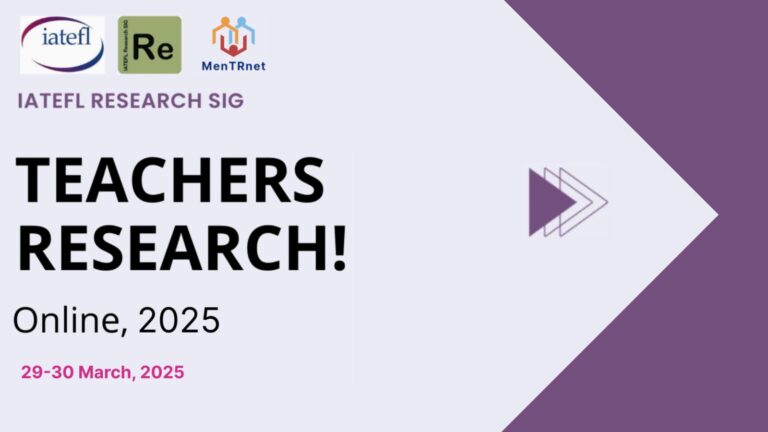
Busy teachers have little time to read, and even less time to write. Research itself can be combined with teaching but busy teachers may decide that writing up their findings for publication is too daunting, tiresome or even unnecessary.
How can we, in our MenTRnet community, find opportunities and offer support for our teacher-research mentor colleagues and their mentees to take the plunge and start writing if they so wish?
In the past couple of years, I’ve become the ‘publication nudger’ in our community and with a dedicated team of ‘writing mentors’ and ‘internal reviewers’ we have managed to expand beyond the “let’s give a short presentation at a staff meeting” or “let’s present our results on a poster” stage. Those are excellent ways of giving an account of our work, but it is easy to see that they may not reach many more people than our immediate colleagues or the audience of a conference on classroom research, not held often enough, unfortunately.
Even though conducting classroom research has by now become part of teacher education and in-service teacher training in many parts of the world, publishing the outcomes of Action Research (AR) or Exploratory Action Research (EAR) projects is still relatively rare (however, see https://mentrnet.net/open-access-resources/ on this website).
Over the past few years, we have managed to facilitate and support the writing efforts of teacher-researchers and mentors of teacher-research in the following ways:
- Creating regular opportunities for book review writing and mentoring the writing-up process of the reviews;
- Inviting teacher-research mentors to write book chapters about their experience (Stories of Mentoring Teacher-research – forthcoming);
- Supporting and facilitating the writing-up of full-length AR/EAR articles where the ‘immediate’ mentor of the teacher-researcher is also a co-author
Out of these three types of writing, I have found that book reviews can be a great first step, and have been the most rewarding for me to mentor.
Book review writing has the following advantages:
- Low risk of rejection (since the reviews are pre-arranged and commissioned)
- Editorial support is readily available (often peer-reviewer support as well)
- Shorter piece to write on an already existing text (achievable goal)
- Faster publication turnaround than original articles (on occasion only 2–3 months)
- Intensive reading on a topic that is of professional interest to you
- Improvement of your academic reading and writing skills
- Complimentary review / inspection copies provided by publishers
- Stepping out into the ‘real world’ of publishing
So, it is book review writing that several of us in the community have been mainly focusing on, with considerable success in the past couple of years. We have built up excellent ‘diplomatic relations’ with a number of journals, most of which are open access. ELT Research, English Language Teacher Education and Development Journal (ELTED), Argentinian Journal of Applied Linguistics (AJAL), The Teacher Trainer Journal (TTTJ), Humanising Language Teaching (HLT) and Modern English Teacher (MET) have all published book reviews written by MenTRnet members as authors or co-authors, and we have even managed or are hoping to publish in top-end (Q1) SCOPUS-indexed periodicals, such as ELT Journal and the Australian Journal of Applied Linguistics (ARAL).
By now, we have established what one might call a ‘good practice of book review writing’. I’m always on the lookout for books that are related to our area of interest, namely, teacher-research, but we often review books that deal with wider issues, such as The Future of English (Kalantar, 2024) or mentoring teachers in general. I consider it a special achievement that we managed to procure and get four different reviews published on Angi Malderez’s (2023) book, Mentoring Teachers in various outlets.
Apart from the fact that seeing your piece published gives you a wonderful feeling, there are some further advantages of book review writing that have become apparent to me over the years:
Decentring (Padwad & Smith, 2023) in at least two senses of the word.
- Most of our authors come from the Global South with English as an additional language for them, and they are now in the process of becoming expert users of English for Research and Publication Purposes (ERPP).
- The majority of our authors are female and making their voices heard is a priority for MenTRnet.
I have also found that our mini-projects can help us develop in the following areas:
- Learning the basics about publishing, such as familiarising yourself with the publication process and the outlets available;
- Liaising with your ‘writing mentor’ and, often, with a co-author as well;
- Liaising with journal editors (or the reviews editor of the journal), and on occasion even making contact with the author/s of the book you are writing about;
- Coming to understand the review process and deal with the psychological burden of your work being critiqued;
- Working patiently and conscientiously on ever-improving versions of your submission.
The assumption is that the experience gained in these areas (and doing all the reading involved!) will stand you in good stead when you start writing up your own research.
We wish you luck and remember: your ‘publication nudger’ and many of our community members in MenTRnet are more than happy to work with you if you feel ready to take the plunge and get down to writing!
Notes
In the coming months, we are compiling a list of all the articles, book chapters and book reviews we have published so far. This is so that one can appreciate our achievements and can also find models of each genre for their own writing.
References
Kalantar, O. S. (2024). Book review. [Review of the book The future of English: Global perspectives, by M. Patel, M. Solly, & S. Copeland]. ELT Research, 39, 59–63.
Malderez, A. (2023) Mentoring teachers: Supporting learning, wellbeing and retention. Routledge. https://doi.org/10.4324/9781003429005
Padwad, A., & Smith, R. (2023). Decentring ELT: Practices and possibilities. AINET Association of English Teachers and the A.S. Hornby Educational Trust. https://bit.ly/decentring-practices
About the Author(s)
Erzsébet Ágnes Békés is a retired Hungarian English teacher and teacher educator currently residing in Ecuador. She has taught English is various international contexts including Ethiopia and the Amazonian jungle. Recently, she has been working with teacher-research mentors and their teacher-researcher mentees supporting their publication efforts as a means of Continuing Professional Development.



This is such an inspiring approach! Creating entry points like book reviews and co-authored articles makes publishing feel more achievable, especially for busy teachers. And the idea of a “publication nudger” is obviously invaluable.
Absolutely agree with all the points made by Eli. And more!
We need to encourage and assist teacher-researchers to share their stories,
to take the step beyond Poster Displays and conference presentations that have no accessibility beyond those in the room. We ought to encourage publications in entry-level journals and books such as are being produced by leaders in MenTRnet and the IATEFL Research SIG. We should aim for mentoring teacher-researchers from A-Z through their research, and to help them publish their experience and findings.
Another aspect in the target of publishing teacher-research is to find journals amenable to a “mentoring approach” with submissions from teacher-researchers, rather than “desk-rejection” — journals with a focus on publishing the “stories” of teacher-researchers rather than an aim for “scholarly research” that is replicable and methodologically “rigourous.”
The role of highly-ranked (“indexed”) journals may be important to the scholarly-research community, but most teacher-researchers in the Global South need a solid start, a place where other teachers feel comfortable. Mentoring includes encourage teachers to read!